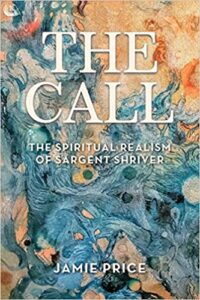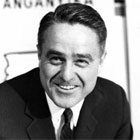REVIEW — THE CALL by Jamie Price
 The Call: The Spiritual Realism of Sargent Shriver
The Call: The Spiritual Realism of Sargent Shriver
by Jamie Price, introduction: Charles Hefling
336 pages
SSPI Press
March 2023
$11.49 (Kindle); $22.00 (Paperback)
Review by D.W. Jefferson (El Salvador 1974–76; Costa Rica 1976–77)
•

Sargent Shriver
Photo by Rowland Scherman
I think of Sargent Shriver as one of the all-time greatest examples of the truth of the saying, “If you want something done give the task to a busy person.” From his anti-racism work with the Catholic Interracial Council of Chicago, to his leadership role in designing and directing the Peace Corps, to his role in running the War on Poverty under President Lyndon Johnson, to his work with Special Olympics International, Shriver was always busy building peace. This book is not a biography or a historical account. This book attempts to answer the question of why he did what he did and how he discerned what could and should be done.
The Call is an imagined dialogue between Sargent Shriver and the character Didymus about the role of the holy spirit in Shriver’s efforts to build peace. Its title both refers to the general idea of being called to serve, and alludes to the pivotal moment when Shriver received the phone call from his brother-in-law, the newly inaugurated President John F. Kennedy, asking him to be Director of the as-yet-nonexistent Peace Corps.
The book consists of nine imagined conversations, which are informed by Shriver’s hundreds of speeches, philosophers and theologians who inspired him, and conversations between Shriver and the author. It is an intimate, unique, often funny exchange about the inner workings of a mind that was always questioning the relationship between spiritual realism, practical idealism and a call to social action.
Author Jamie Price knew Shriver personally and served as the Founding Director of several programs dedicated to understanding and advancing Shriver’s approach to leadership and peacebuilding.
The book includes extensive end notes and a detailed bibliography which help the reader place this imagined dialog into the context of Shriver’s extensive writings and speeches.
As the author states:
By engaging in this conversation, you, dear reader, are cordially invited to ask your questions and to discover within yourself the model of spiritual realism Sarge used in his efforts to build peace.
•
D.W. Jefferson was a Peace Corps agriculture volunteer in El Salvador (1974-76) and Costa Rica (1976-77). A blog about his Peace Corps years is at:dwjefferson.blogspot.com He is currently retired from a career in computer software engineering.
No comments yet.
Add your comment